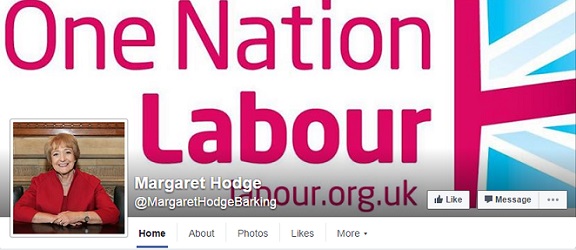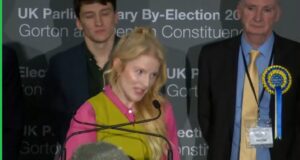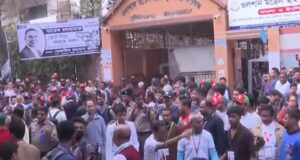Not for the first time, Margaret Hodge has opened her mouth and put her foot in it. The woman who was entirely perplexed by the rise of the BNP in her own constituency turns out to be equally confused about the referendum vote. With the possibility of a snap General Election being called before the end of the year, Ms Hodge has decided that the best way to save us from the Tories is… to launch (or at least front) an attack on the Leader of the Labour Party.
Margaret Hodge MP is not the sort of socialist who has had to struggle to earn a crust and put a roof over her head. She was born Margaret Oppenheimer – daughter of Hans Oppenheimer who found a steel trading company which is still one of largest steel companies in the world. According to the Parliamentary Register of Members Interests, she disposed of her shares in the family steel firm last summer – shares which fell into the category of “valued at more than £70,000”.
She supplements her parliamentary salary with public appearances and consultancy work. The most recent entry in the Register of Interests shows that in April 2016, when most London MPs were running themselves into the ground campaigning for Sadiq Khan alongside their usual duties, she received £5,000 from Interserve (one of those strange companies that offers a range of advice and support for other businesses) for 45 minutes work in preparing and delivering a speech.
She also was part of a group which visited “Israel and Palestine” in September 2008 – on a trip organised by Labour Friends of Israel. LFI paid for the visitors’ accommodation “at a rate discounted through the Israeli Ministry of Foreign Affairs”.
Margaret Watson (nee Oppenheimer) began her political career as an Islington Councillor, eventually (as Margaret Hodge, following her second marriage) becoming Leader of the Council in the landmark elections of 1982, when the newly emerging Labour Left organised to win a number of positions in London Councils and the Greater London Council (GLC) itself. In the next few years she moved from being part of the active left – which tried to use Councils to empower local people and bring about lasting change to material circumstances and attitudes – to the pragmatic left – stay in office at all costs, and do a bit of good in a managerial way if you can.
This was to prepare her for being MP for Barking in the 1994 by-election caused by the death of Jo Richardson, a solidly left MP. (Jo Richardson’s long term constituency agent was one Jim Fitzpatrick who had long wanted to succeed Jo in the constituency but whose hopes were thwarted by Hodge’s determined campaign. Fitzpatrick later won the new seat of Poplar & Canning Town in the 1997 General Election.)
Labour, under Tony Blair, won the 1997 General Election, and just over a year later Hodge was appointed Under Secretary of State for Disabled People, later being promoted to Minister for Universities. Her time as Minister of State for Children was somewhat blighted by allegations that she had not handled child abuse allegations correctly when she was running Islington, but after two years she was moved on to become Minister of State for Work.
And that it what makes her response to the BNP threat in Barking so puzzling. There she had been, at the heart of the Blair Government which was running the country and carrying on Tory policies of not building Council homes and running down most public services. She was one of around 300 people in the country who was well placed to argue for a change in government policy in favour of the needs of her constituents and people like them. She was a London MP who could meet her constituents on a daily basis and keep up to date with their concerns.
During the first few months of 2006, it was clear that the British National Party (BNP) were making a strong showing and likely to win a number of seats in that May’s Council elections in Barking & Dagenham. Hodge hit the headlines for talking about the BNP, saying that it was not surprising that her constituents were drawn to racist BNP policies as they were suffering from a lack of housing and public services and were seeing immigration as a cause of their problems.
If Hodge knew that the Labour Government’s policies were not delivering for her constituents, why didn’t she mention it in the Government of which she was a part? If Hodge knew that her constituents were blaming immigrants for their problems, why hadn’t she campaigned against this kind of knee-jerk racism before? Worse: the timing of her comments gave the BNP welcome publicity and they went on to become the second largest party on the Council.
Four years later, Council elections coincided with the General Election, and Nick Griffin, Leader of the BNP, stood against Hodge for the Barking parliamentary seat. Anti-fascsist and anti-racist campaigners piled into the borough, and Hodge held the seat – with Hodge using her victory to claim that her acknowledgement of her constituents’ fears had been instrumental in her victory. If she had behaved like a Labour MP (rather than a Lib-Dem) and if the Government had behaved like a Labour Government (rather than trying to carry on the tradition of the Tories) she would not have had that kind of fight in the first place.
In the aftermath of the EU referendum result, Hodge has now decided to turn her incisive political brain to the question of how it could be used to unseat Jeremy Corbyn as Leader of the Labour Party. Remember: the referendum was called by Cameron, as a gamble to neutralise the UKIP threat to the Tories chances of forming a majority Government after the 2010 General Election. The tactic secured its aim, but the risk did not pay off, as the Brexiters in Cameron’s own party led the “leave” campaign that went on to be successful.
That campaign played the race card, hinting in many subtle ways, in words and pictures, that immigrants were to blame for the loss of security people had felt since the 2008 crash – and that Britain could only resolve its problems by leaving the EU. It wasn’t really that different a message from the one that had rattled Hodge in Barking a decade ago – but she was still reluctant to admit why it was a winning argument.
Did Hodge blame Cameron, who had called the referendum, for not being able to deliver his party’s MPs and voters to support “remain”? No. Did Hodge congratulate Labour for putting a case that had won over two thirds of their voters to support “remain”? No, again. Did Hodge acknowledge that Corbyn’s willingness to criticise the EU but still come up with a “better in than out” argument actually chimed with voters more than a stars-in-your-eyes approach? No, not even that.
Instead, Margaret Hodge blamed Jeremy Corbyn, Leader of the Labour Party, for the referendum outcome – because he had not been enthusiastic enough about the EU. Corbyn’s lack of enthusiasm had, she said, outshone Boris’s campaigning, Farage’s campaigning and Gove’s campaigning. If only Corbyn had been a bit more enthusiastic about the EU, all those non-Labour voters in the Midlands (an area of marginal seats suddenly renamed by the media as “Labour’s heartlands”) would have decided that Boris Johnson’s novel idea of blaming the immigrants was a load of tosh and they would have been flocking out to vote “remain”.
It is possible that Hodge actually believes this nonsense. Others, however, do not – but are delighted that she is fronting another attack on Corbyn. Corbyn has massive support among Labour members and supporters, but much less support among Labour MPs. There are some Labour MPs who still believe that because they personally do not support Corbyn’s approach, Labour could not win a General Election under his leadership. There are even some who are so fearful of the policies they believe Corbyn would pursue that they would rather lose a General Election than see him succeed.
These MPs were hoping to get rid of Corbyn last May – but the local election results were not as bad as they had hoped, so they could not mount a challenge. Now they are trying again. These MPs are determined to stand by the policies that lost the last two General Elections and to find a Leader who is much less popular than Jeremy Corbyn. This is the political strategy that Hodge is obligingly helping out. She intends to put a motion of no confidence in Jeremy to Labour MPs who are meeting on Monday night (27th June).
Now Labour Party members and supporters are rallying to confirm their loyalty to Jeremy Corbyn in the face of the own goal that Hodge is trying to score. There are two reasons why you should help them: first, because the residents of Tower Hamlets will do very much better under a Labour Government, and the Corbyn leadership is their best way of getting one; and second because the residents of Tower Hamlets will suffer so greatly the longer this Tory Government – or a Boris-led Government – continues.
Incidentally, the referendum result in Barking & Dagenham, where Margaret Hodge is an MP, was 37.6% in favour of “remain” and 62.4% in favour of “leave”. In other words, she was not able to convince her own constituents to back her own position. The result in Islington, where Jeremy Corbyn is an MP, was 75.2% in favour of “remain” and 24.8% of “leave”. Ms Hodge remains oblivious.
•Here is where you can sign a petition to support Jeremy Corbyn (and then share it around your networks):
https://you.38degrees.org.uk/petitions/a-vote-of-confidence-in-jeremy-corbyn-after-brexit?source=twitter-share-button
•Let Margaret Hodge know you disagree with her by sending her a short email to:
margarethodge@hotmail.co.uk
•Post her a facebook message on:
https://www.facebook.com/MargaretHodgeBarking/
[Adverts]
 East London News A Force for the community…
East London News A Force for the community…




